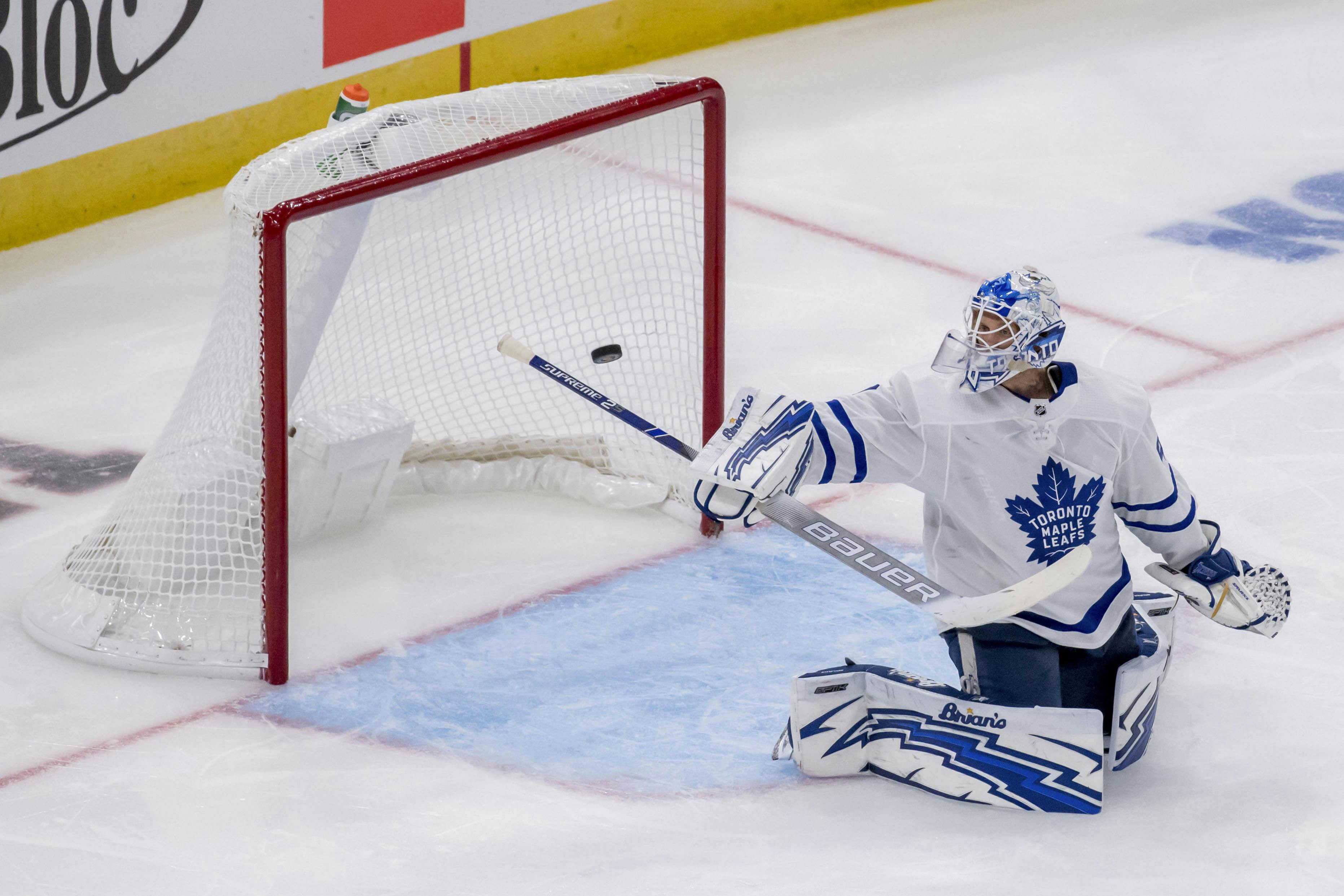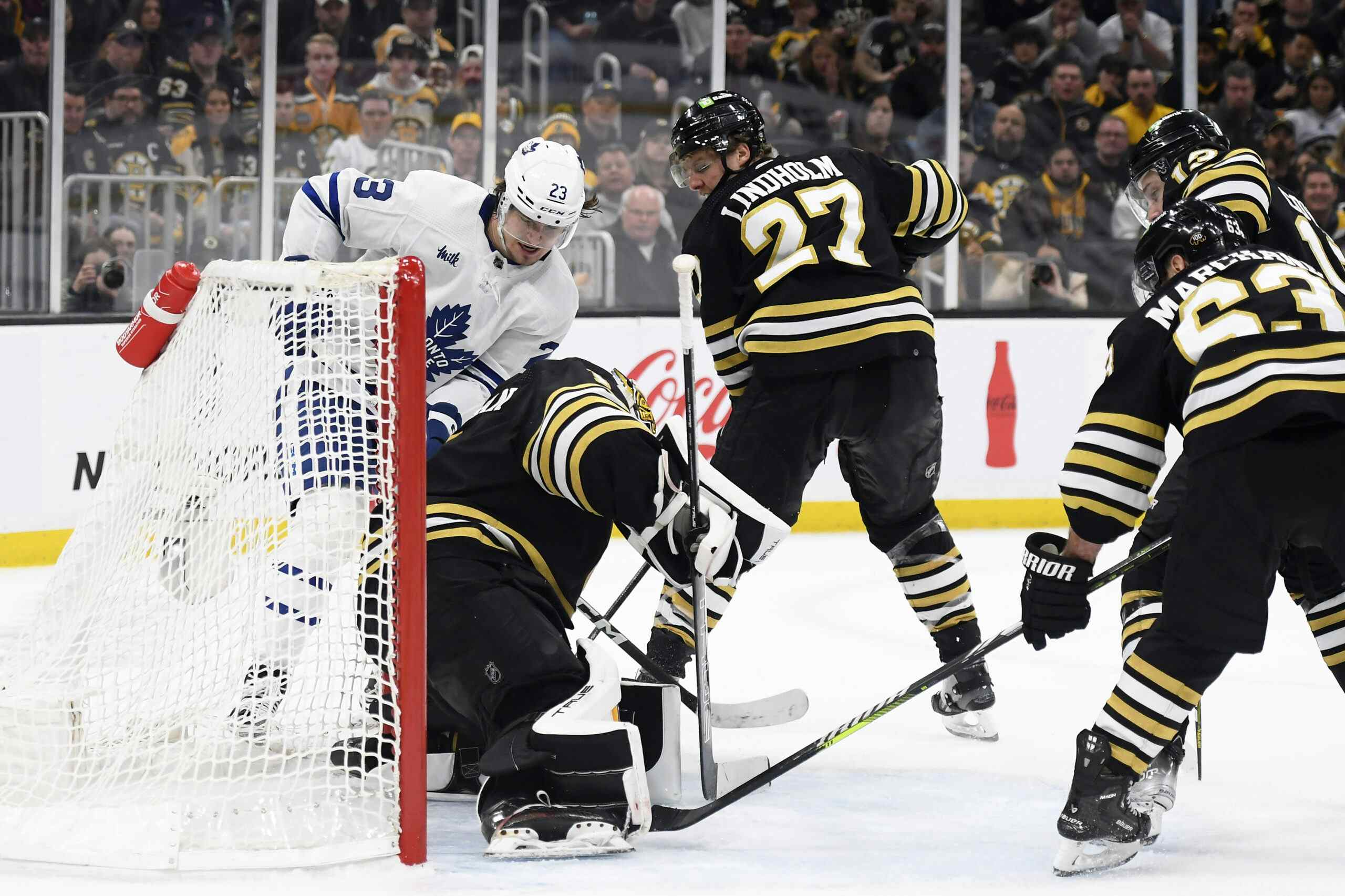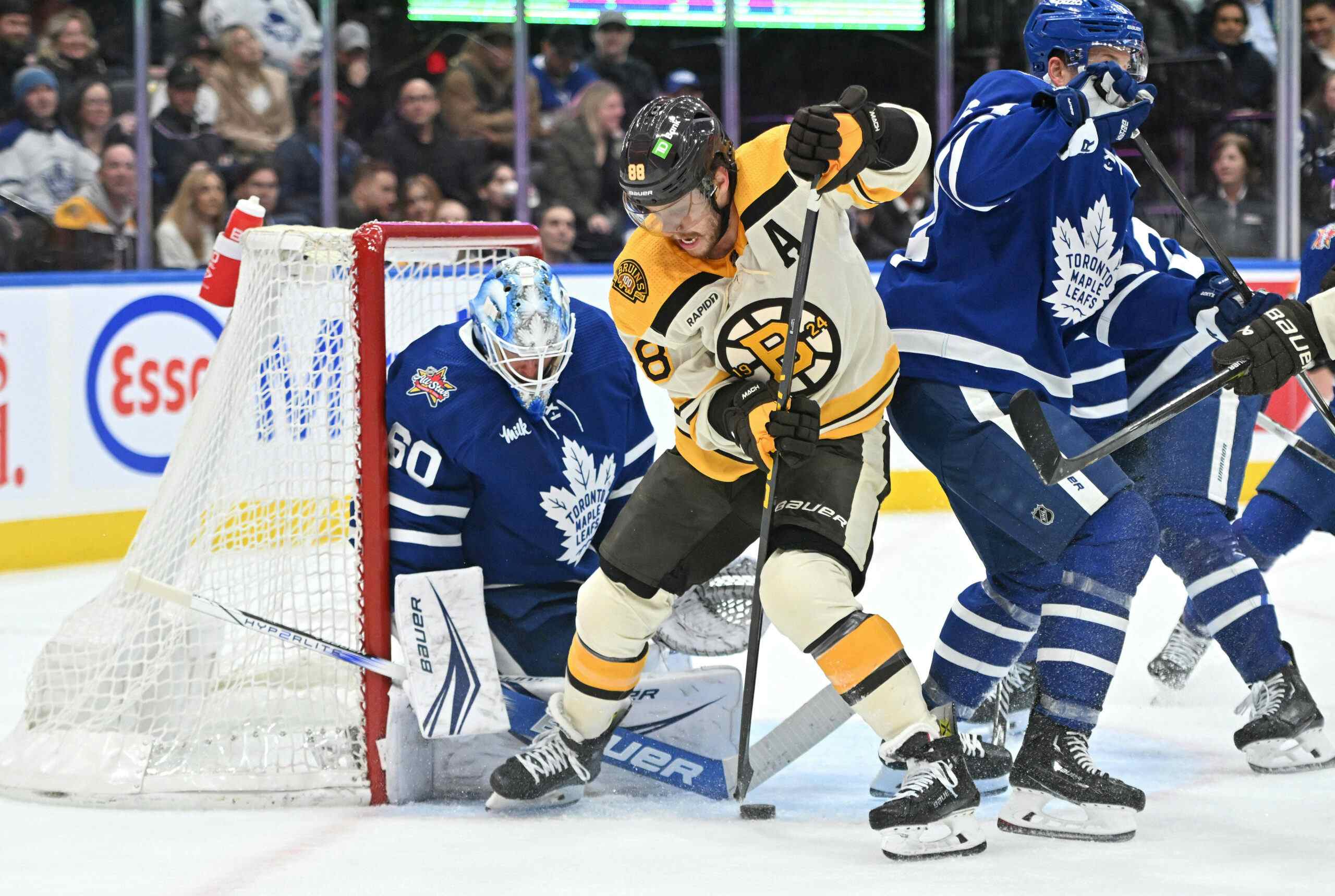Garret Sparks and the Burden of Constant Opportunity

The Toronto Maple Leafs selected Garret Sparks in the seventh-round of the 2011 NHL Entry Draft, 191st overall. That was seven years ago. 84 months; 447 weeks; 3,131 days.
And though it may not feel like it, that is a long, long time.
In June 2011, Barack Obama was in his first term as President of the United States, beginning to only lay the groundwork for his eventual re-election bid the following year. “Harry Potter and the Deathly Hallows: Part Two”, meanwhile, dominated the domestic and international box offices, tying a final bow around a beloved film and book series that, now over a half-decade later, many people still will not shut up about. On the music side of things, Gotye’s smash-hit breakup single, “Somebody That I Used to Know”, would drop in roughly two weeks and stand atop the Billboard Hot 100 charts for nearly a calendar year before the Australian artist would vanish entirely from the public eye and ultimately fulfil its prophecy.
I was 16-years-old.
The world has changed a lot since 2011. Namely, Garret Sparks was a member of the Maple Leafs then, and now he is not. The 26-year-old’s tenure in Toronto abruptly concluded last week by way of trade, sending him to the Vegas Golden Knights in exchange for David Clarkson (‘s dead contract) and a fourth-round pick in 2020.
In all likelihood, it was an exit neither the organization nor Sparks could have foreseen twelve months prior.
Even in the aftermath of Sparks’ departure, though, it’s important to recognize how remarkable his longevity truly was. Few later-round prospects manage to stick around within the same organization that drafted them for seven full years, and especially those who happened to be chosen in the seventh. Sparks beat those odds. That means something.
The Elmhurst, Illinois-native underwent a turbulent ascension during his time as a Leaf, spending stints of varying lengths at every greasy rung of their internal ladder; from the ECHL’s Orlando Solar Bears, to the AHL’s Toronto Marlies, and, eventually, a final spot on the big club. Regardless of how you feel Sparks performed in that last one, he made it there nonetheless.
A total of twelve different goaltenders have occupied Toronto’s crease for at least one game since Sparks heard his name called on June 23rd, 2011. That is a lot. Perhaps more than any team should harbour in that time-frame, really. And yet, prior to last week’s events, Sparks had outlasted all but two of them: Frederik Andersen and Michael Hutchinson – the latter of which entered the fold a mere seven months ago.
There is indeed a flip-side, though.
For as rare as it was for a seventh-round pick to earn the staying power Sparks ultimately did, it is equally, if not more rare to for an organization afford a seventh-rounder the number of opportunities Sparks saw from the Leafs.
TLN
“Opportunity” is Sparks’ buzzword of choice here, so we’re going to make it ours, too. Albeit, not in a flattering way.
Speaking with NHL.com’s Tracey Myers shortly following his trade, Sparks otherwise demonstrated his usual candid interview style which has both endeared him to and demonized him amongst, the Leafs’ fanbase over the years. It’s hard not to see why.
Sparks is not one to mince words. And within a sport predicated on finding different ways to phrase “pucks in deep”, the method of which Sparks projects what is on his mind at any given moment is naturally not going to be accepted by all.
On some occasions, Sparks’ public unabashedness is used for the ultimate good, such as when he called reporters back following a Marlies game in 2018 to offer a touching tribute to Roy Pejcinovski, a 15-year-old goalie for the GTHL’s Don Mills Flyers who had tragically passed away weeks earlier.
On others, it sees Sparks operate without a filter. He could use a filter.
“All I’ve wanted is a fair opportunity, come camp, to try and make the team and I think that I’ll get a better opportunity [with the Golden Knights] than I would have in Toronto,” Sparks told Myers.
“At the end of the day, that’s what you’re looking for as a player.”
If the two typical responses to any Sparks quote are endearment or demonization, his most recent one certainly didn’t accomplish the former. Twitter quickly engulfed itself in accusations of hypocrisy and a lack of self-awareness towards Sparks, some of which, given the context of the interview, were unfounded.
Of course, Sparks’ mention of “opportunity” to Myers was in reference to this coming training camp, in which he would enter another dog fight with at least two other goaltenders for the right to the Leafs’ backup role once again, and not the past.
That caveat, though, doesn’t matter. At all.
The two adversaries Sparks would’ve found himself competing against for the Leafs job in September were Hutchinson and Michal Neuvirth; the former a 29-year-old tweener signed to a one-year, $800,000 deal after spending all but nine games in the NHL last season; the other a 31-year-old abhorrently injury-prone veteran entering camp on a Professional Tryout Offer and who hadn’t cracked the 40-game barrier since 2011.
If either option precipitates a “lack of fair opportunity” to the player tasked with competing against them, it says far more about the merits of that player than those of the organization he hopes to earn employment with.
Even if we were to observe Sparks’ comments solely through the lens of this coming season (which we won’t, so bear with me), they hold absolutely no water.
“I’ll be ready next year” were among the last on-the-record words he spoke to the media in 2018-19, coming shortly after an embarrassing performance versus the Carolina Hurricanes in which Sparks allowed three goals on 36 shots. Two of them, mind you, are near-locks to earn second lives as blooper fodder for years to come.
Sparks didn’t know it at the time, but that would be his final start as a Leaf.
In light of his discussion with Myers, it’s therefore pretty hard to imagine Sparks taking his “ready for next year” pledge seriously when he apparently viewed the hurdles of a tryout flier and career journeyman with a cumulative .908 save percentage as too daunting to clear.
The job of a professional athlete is to perform at the highest possible level to achieve sustainability in their profession. With sustainability, then comes success. That is what the Leafs expected from Sparks. What did he think was going to happen? He’d report to camp and be handed the backup role on a silver platter?
Of course not. That happened last year.
TLN
The thing about opportunity is that it is a finite resource. You can be given only so much before ultimately running out.
Last week, Sparks left Toronto with a tank teetering on empty.
Seventh-round picks are not supposed to make noise. In fact, it is strictly forbidden for them to do so. The lacklustre draft position of these prospects means their road to the NHL will be long and winding, perhaps even impossible. Some make it; some don’t. In any case, that road will be quiet, conquerable in part by putting one’s head down and getting to work.
Internal suspensions do not tend to be quiet.
In November of 2016, Sparks responded to a troll within the closed Facebook group, “Goalie Gear Sluts”, who was in the midst of bullying a member who identified as being disabled. Once again, Sparks did not mince words. Spread across many comments, Sparks asked where the harasser lived before threatening to drag him to centre ice and beat him “to a fucking pulp” so that he couldn’t run “that bitchy little mouth”.
Sparks also mixed in a little sexism for good measure, critically describing the harasser as a “13-year-old girl”.
It was not a good look. Though much like his on-ice play, Sparks’ intentions were clearly admirable – defending a disabled person being mocked online for a condition he has no control over by a sad, worthless human being is a worthy cause, after all – but his execution was about as misguided as humanly possible.
Playing for hockey’s most well-known and, therefore, highly-scrutinized franchise brings with it some important responsibilities; refraining from issuing violent threats online and opting against the use of sexist language being two of them.
Sparks killed both of those birds with the same stone, and the organization swiftly sent him home from the Marlies’ road trip through Utica before suspending him indefinitely.
Most seventh-round picks would see their tenure with their team in question end right then and right there. But Sparks was fortunate. In an OPPORTUNITY few of his peers would have in similar circumstances, the Leafs afforded Sparks the OPPORTUNITY to earn their trust back.
The year prior, Sparks found himself thrust into starting duty on the Maple Leafs following a trade deadline in which the team shipped James Reimer to San Jose for the purpose of The Tank™. Sparks proceeded to earn a 6-9-1 record in 17 games as Toronto’s newly-crowned starter, posting a .893 save percentage and 3.02 goals-against average (not like that stat matters anyway), to boot.
Some would argue that Sparks was set up for failure. The 2015-16 Leafs were engineered on a near-genetic level to be the Titanic, and management threw Sparks into the engine room while tasking him to bail it out with a spaghetti strainer.
It wasn’t fair. Then again, neither is hockey.
Sparks’ first taste of NHL action went about as poorly as perhaps even his harshest critics could’ve foreseen. And given how the Leafs, at that point, were in the latter stages of a painful rebuild, their brain trust couldn’t have been blamed for opting to remove Sparks from future plans entirely.
Andersen would be acquired months later; Reimer would hit the free-agent market shortly after and theoretically be re-signed. Not to mention, the Leafs then spent their third-round pick in the 2016 draft on goaltender Joseph Woll.
They had options. And what sense did planting a flag in a sub-.900, 23-year-old, pending RFA make for a team with options?
But the Leafs bucked convention. They didn’t have to, but they did. On July 15th, 2016, management re-signed Sparks to a one-year, $575,000 contract, affording him the OPPORTUNITY to wash away the memory of his disappointing debut and earn a spot in their future.
TLN
Down on the Marlies, Sparks began to cement himself amongst the AHL’s premier goaltenders.
Laying a foundation of terrific on-ice results – a .922 save percentage in 2016-17; .936 in 2017-18 – he grabbed the starter’s reigns for good in 2018 before proceeding to capture that year’s Baz Bastien Award (the AHL’s Vezina) and Harry “Hap” Holmes Memorial Award (the AHL’s Jennings), while also leading the league in save percentage and backstopping the Marlies to their first-ever Calder Cup.
Over the course of those two seasons, though, Sparks would reportedly also clash with Marlies head coach, Sheldon Keefe on numerous occasions. In fact, the two learning to co-exist with one another was mentioned as a key driving force in the aftermath of the team’s Calder Cup victory, although one can only wonder as to the grounds a then-24-year-old Sparks had in questioning the decisions of his veteran coach.
But Keefe didn’t flinch. From 2016-2018, he gave Sparks repeated OPPORTUNITIES to thrive in his crease, of which Sparks admittedly took advantage.
Calvin Pickard‘s arrival early in the 2017-18 season then paired Sparks with a veteran mentor and internal source of motivation, both of which he needed. It was an unexpected development. The Maple Leafs acquired Pickard as a means of insurance; for injury at the NHL level, or setbacks down below.
So, when the Marlies hit the road for games three and four of their first-round playoff series with the Utica Comets only to quickly drop both – three goals on seven shots surrendered by Sparks in game three; five goals on 20 shots in game four – the series-clinching game five was precisely the type of moment Pickard was brought in to handle.
But the Marlies stuck with Sparks. With their season on the line, Keefe threw caution to the wind and eschewed his safety valve in favour of handing Sparks the OPPORTUNITY to re-gain control of the series.
It worked. The Marlies wouldn’t lose again for 35 days.
TLN
Enter; the 2018-19 season.
Sparks reported for training camp the following September in a truly foreign position; as the clear favourite to earn the backup job on the Leafs.
Emerging victorious was as close to inevitable for Sparks as the circumstances dictated. Few factors would be capable of threatening his odds, either; not a pair of veteran competitors, not a string of disastrous pre-season performances, and somehow not even a pre-camp interview with The Athletic in which Sparks admitted to not playing the position he is paid to play at all over the summer.
All of those details were succinctly cast aside, though. That seemed to happen a lot with Sparks.
Statistically, he was the fourth-best goaltender during a preseason in which the Leafs’ crease was occupied by four different bodies. Sparks finished with a .833 save percentage in three “games” of preseason play, surrendered five goals on 36 shots in his lone full start versus Montreal, and was outplayed in nearly every conceivable fashion by both Pickard and Curtis McElhinney.
Of course, the inevitable still happened: The Leafs declared Sparks victorious anyway and embarked upon the 2018-19 campaign with him as their backup.
As a result, Kyle Dubas was forced into placing McElhinney and Pickard on waivers, hoping to sneak at least one of them through unclaimed. It didn’t work. Both netminders were snatched up almost immediately upon hitting the wire by ancillary teams, therein stripping the Toronto of their once-defined goaltending depth in the name of handing Sparks an OPPORTUNITY many believed he hadn’t truly earned.
The decision did make sense, though – at least at the time. Sparks was the youngest option of the three backup hopefuls in camp, had been in the organization for nearly seven years, and was coming off a historic season in the AHL. Inviting in the risk of losing him for nothing thanks to a three-game sample size didn’t compute.
So, management once again afforded Sparks the OPPORTUNITY to prove them right.
He didn’t.
Sparks’ first full NHL season was the epitome of disaster. Some of that failure was his fault; some of it was not. But it wasn’t just the .902 save percentage Sparks earned in his 20 total games, or his horrendous performance in the long-anticipated Long Island homecoming for John Tavares, or even the concussion he sustained from a freak practice shot to the head which sidelined him when the Leafs needed him the most.
Sparks couldn’t control that last one. It happens.
What he could control were his words. He just chose not to.
On November 12th, Sparks told reporters that he was still adjusting to the lengthy waiting period in between starts that was necessitated by the backup role, explaining: ‘It’s almost like you really forget that feeling of being in the net”.
(A good cure might be to actually do that a few times over the summer.)
A few months later, on March 16th, Sparks surrendered six goals on 44 shots to an already-31st-place Ottawa Senators team that had just traded Mark Stone, Ryan Dzingel, and Matt Duchene at the deadline weeks prior. Speaking to the media following a blowout loss to the worst team in hockey, Sparks opted to publicly question the effort level of his teammates.
“We need more emotion from everybody,” Sparks declared.
“We need people to get angry. We need people to step up and get mad and take it personally”
At the time, Sparks was in the midst of a 10-game stretch which saw him post three wins, allow 32 goals against, and earn a .894 save percentage.
Addressing the media on April 2nd, shortly on the heels of what would ultimately be his final start as a Leaf – that very same “ready for next year” availability, in fact – Sparks declared his 2018-19 season as not yet over and pledged that he was “…still going to be a big part of this team going down the stretch”.
Three days later, the Maple Leafs removed his locker from the practice facility, recalled Hutchinson from the AHL, and announced that Sparks would be spending the next 10 days away from the team in an effort to re-discover his technique while working with the Marlies’ development staff.
“What we tried to do, because we believe in Sparky, is give him every opportunity,” Mike Babcock explained of the decision.
This all came in contrast with the events in February, when the organization committed themselves to their embattled netminder once again despite another tough stretch, just as they did in July of 2016, by agreeing to terms on a one-year, $750,000 extension underlined by the assumption that Sparks would be the Leafs’ backup in 2019-20, too.
Even in failure, opportunity knocked nonetheless.
Seventh-round pick? Here are seven years of leeway. Internal suspension for violent and sexist behaviour online? Sparks was afforded an opportunity at redemption by Lou Lamoriello; notorious for his reputation as the most ardent executive in the league.
Disastrous NHL debut stretch? The Leafs extended him anyway. Disastrous first full-length NHL season? The Leafs extended him again. Publicly calling out his teammates after he got pumped for six goals against by a borderline-AHL team? Sparks saw three more starts regardless.
To top it all off, once the organization eventually deemed him too unstable to even sit on their bench throughout the playoffs, a 10-day sabbatical is all Sparks received – the opportunity to earn his way back into the job with hard and specialized work.
At a certain point, that finite resource runs out.
Sparks left the Leafs organization last week having seen more opportunities than 90% of prospects could ever dream of. A portion of that is due to Sparks himself. He earned a number of his shots. But to lament being withheld one final one while walking out the door is, quite simply, laughable.
It remains to be seen whether Sparks will be given a similar treatment in Vegas.
Recent articles from Mike Stephens





